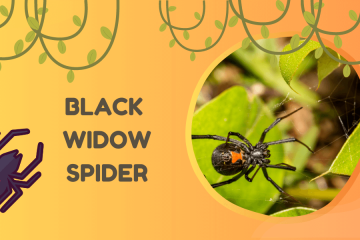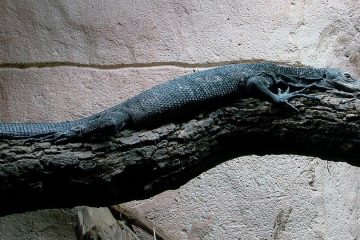When your guinea pig has newborns it can be an exciting time, but there are also some important things to know. I worry about my guinea pig’s safety and health as a pet parent, so I like to do as much research as possible to ensure they are properly cared for.
If you have questions about guinea pig babies, keep reading for valuable information.
From caring for a pregnant female to recognizing a rejected newborn, I’ve compiled some of the most important facts and instructions when it comes to caring for your newborn guinea pigs.
What you should know about newborn guinea pigs?
There is a lot to learn about guinea pig babies. I found all of these facts about guinea pigs and their babies so interesting, I wanted to share them with you.
- Guinea pig babies are actually called pups
- Female cavies are called sows and males are called boars
- The gestation period is about 59 to 72 days or about two months
- Newborn guinea pigs weigh only 100 grams but they grow quickly
- New babies are born with teeth, claws, and fur
- Newborn guinea pigs can open their eyes after they are born
- They are able to start walking right after birth
While these facts are not essential to caring for your pet, they are good to know. I love to share information on my cavies with other pet owners and hear their personal stories as well.
You can learn a lot of helpful information from the experiences of others!
How many babies do guinea pigs have?
Female cavies can have between one and eight newborns per litter. Most litters range from two to four pups. Females can have five litters per year, but this can be quite dangerous for their health.
You can find more details about how many babies do guinea pigs have.
Any pregnancies at all can be dangerous for your female, so I recommend spaying and neutering your pets as soon as possible.
Breeding is not safe for most pet owners. It can shorten your female’s lifespan, especially if they are eight months old or older. Females experience a natural stiffening of the symphysis as adults.
This makes it difficult for older cavies to give birth and can lead to death.
I have found that it is easier to neuter male cavies or keep them separate from your females. Spaying is more dangerous than neutering, but keeping the two sexes apart can completely eliminate the risk of pregnancies.
Watch this 50-second video to see how many newborn guinea pigs can a mother have:
What if a mother guinea pig rejects a baby?
This was my biggest fear about guinea pigs giving birth. In the wild, an animal that is rejected by their mother is usually left with little chance of survival.
There are some situations where a mother guinea pig may reject their baby, but you can still keep the baby safe and healthy. It just may require a bit more work on your part.
How to recognize a rejected baby guinea pig
A mother will not reject her newborn if you touch them. There can be any number of reasons they choose to reject their babies, and we may never fully understand why.
There are some ways to recognize if they have been rejected though.
The most common sign is that the mother does not allow the baby to nurse. If you notice her nipping at the baby and keeping them away from her milk, they might be rejected. Most females are not overly protective of their babies.
They do not build nests for them or spend much time with them. Those behaviors are normal. The main cause for concern is the lack of feeding.
How to care for a rejected newborn guinea pigs
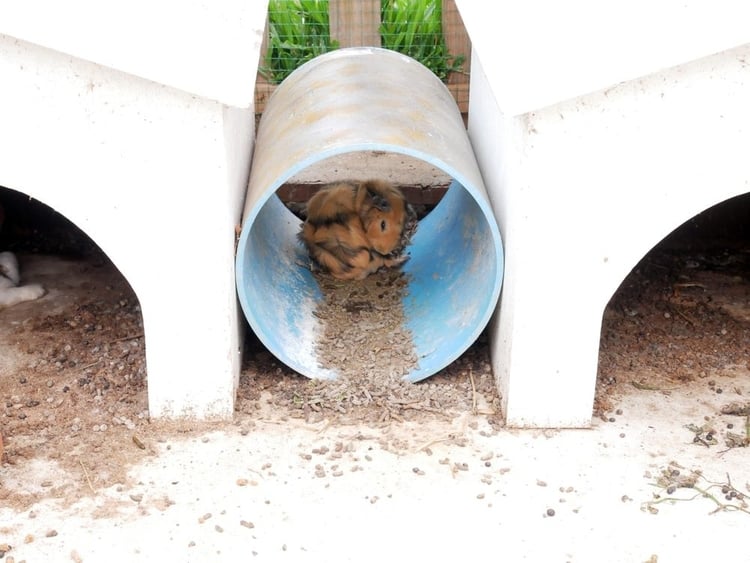
When a mom rejects her pup, you will have to step in to keep them healthy. It can seem scary to care for a tiny baby, but humans have successfully taken over for mothers many times.
If you find yourself with a rejected baby, don’t panic. A lot of love and attention is necessary, but you are more than capable of caring for them.
Here are some helpful tips to follow if you are left with a rejected pup.
- Feed the pup every hour and a half
- Soak a piece of brown bread in milk and offer a teaspoon to the pup to suck out the milk
- Avoid using a syringe because the pup can drink too fast and choke
- Full-fat goat’s milk is the best option
- You can also use a milk mixture with half water and half evaporated milk
- Let the pup suck out as much milk as they want during each feeding
- Keep the baby warm with a hot water bottle that is wrapped in blankets
- Stimulate the pup so they can go to the bathroom with a cotton swap for the first few days
If you are diligent with their care, pups can survive without the nourishment and love of their mother. It takes a lot of time and attention to rescue a rejected pup, but it is worth it to save their little lives.
Can the father guinea pigs be with the babies?
For humans, it is common for fathers to be with their babies after birth. Naturally, I wondered if the same was true for guinea pigs. Males cannot be with the mother or newborns after birth.
In fact, males should be separated from pregnant females throughout and after gestation because they can become aggressive. It is crucial for the newborn guinea pigs to stay with their mother therefore, they cannot be with their father.
Males are not needed to care for newborns, and they likely do not have much interest in their babies anyway.
Does guinea pig eat their babies?
I have heard a lot of stories about guinea pigs eating their babies after birth. This is actually a common occurrence among rodents, and it likely stems from their natural instincts.
In the wild, rodents suffering from a food shortage might eat their babies to stay alive. Thankfully, this is not as common among cavies as other rodents.
That does not mean it is impossible, though. Yes, guinea pigs may eat their babies. This only happens in rare cases, but there are some things you can do to prevent this from happening.
How to prevent mothers from eating their newborns
Most cases of cannibalism with cavies result from malnutrition. This is a similar situation to what happens in the wild. If there is a shortage of food and nutrition, females will eat their young.
You can easily prevent this from happening by ensuring your female is properly nourished during their pregnancy. Follow these steps to care for the pregnant cavy:
- Give them access to plenty of food and water: I really like this Kaytee Fiesta guinea pig food on Amazon that’s a nutritionally fortified gourmet diet made of a premium blend of fruits, vegetables, seeds and grains offering maximum variety, fun, and nutrition for female during their pregnancy.
- Supplement their vitamin C intake
- Provide the right amount of dietary calcium
- Keep their routine the same throughout pregnancy
- Provide plenty of space for them to exercise.
- Minimize their stress level
- Do not change their housing arrangement late in pregnancy
- Have your vet evaluate the female to check their pelvis
- Contact your vet if they eat less, have reduced fecal droppings, are slow or lethargic, or have bloody discharge.
You can see when you should take your guinea pigs to the vet in this article.
Cannibalism may occur if mothers give birth to multiple litters in a short time period. You should not breed your guinea pigs in general, but it especially dangerous to have back-to-back pregnancies.
Females are more tired and stressed after each pregnancy, which can cause a wide range of issues. Keep females and males separated to ensure your female cavies do not get pregnant again.
Do guinea pigs eat their babies if you touch them?
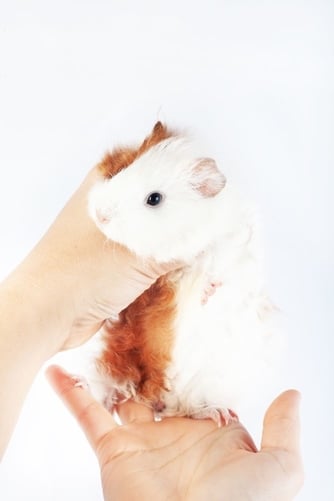
Handling the newborns should not impact the mother’s attitude toward them. Females are not more likely to eat their babies if you touch them. However, you should limit the handling of baby cavies as much as possible.
In most cases, the female instinctively knows how to care for their young. While they may not be overly affectionate or protective of the newborns, they will provide the level of care they need to grow.
It is safe to handle a baby, but they need to spend most of their time near their mother. Close access to the female allows them to feed or receive warmth when needed.
The mother will also need to lick them to keep them clean and encourage them to go to the bathroom. Females must eat the placenta after birth to start the production of their milk, so you do not want to interfere with this process.
If you handle the newborns, there are a few things you should do to ensure they are safe. Always use two hands even though the babies are small. If the pup starts to squirm, gently place them back in the crate with their mother.
It is okay to handle them frequently as long as you are gentle, but you should only touch them when they are awake. They need as much rest as they can get. You should also avoid handling the babies when they are nursing.
If you decide to handle your cavies, I highly recommend one of the tricks that I explained here. (Hold And Catch My Guinea Pigs)
How long does a baby guinea pig need to be with its mother?
When it comes to people, most children stay with their parents for the first eighteen years of life. Even after we grow up, we come back to visit our parents and spend time with our families. In the wild, animals behave much differently than humans.
Males must be separated from their mothers after three weeks. They need this time to nurse and grow enough to live on their own.
I would consider four weeks to be the maximum amount of time male guinea pigs can stay with their mother.
This may seem like a very short period of time, but guinea pigs have shorter lifespans than humans and they age relatively faster.
Separating the male newborn from their mother provides safety for both the babies and their mom. This separation prevents further breeding from occurring between the litter or with the mother.
You can get this awesome inexpensive cage for around 30 bucks on Amazon (click the link to check the current price)
Females can stay with their mothers for their entire life if you choose not to rehome them. Try to keep them in small groups to avoid them becoming overwhelmed.
You should also monitor groups of females to prevent aggression and fighting. If you notice signs of aggression, it is crucial to separate the cavies for their safety.
If you have chosen to allow the father near the newborns, they should not come in contact after 21 days. This will prevent breeding among females.
Male newborns may be able to share a habitat with their father if they get along. I recommend trying to keep the brothers together.
It can be difficult to introduce cavies to one another, so keeping them together from birth makes the process easier. If they grow up together, they may be less likely to fight or harm one another.
After three weeks, it is safe to house your newborns with other guinea pigs outside of their immediate family. Just remember to keep females and males separate. A repeat pregnancy is very dangerous for the mother.
How do you determine your piggy’s sex?
It may be difficult to determine your pet’s sex right after birth. You can wait a couple of weeks to examine them, but you should not wait longer than three weeks.
If you are unable to sex your cavies, you should consult your vet as soon as possible. Determining their gender is crucial to separating them later and keeping them safe.
Follow these steps to determine the sex of newborns:
- Be very gentle, they can easily become stressed away from their mom
- Examine them in a warm area so they do not get cold
- Wash your hands thoroughly and do not use lotions or hand sanitizers
- Examine them on a low and stable surface
- Place a clean towel on the surface
- Hold the pup firmly to keep them from falling out of your hand
- Female genital areas form a “Y”
- Males have a genital opening shaped like a dot with a small penis above skin level
If you perform these steps and determine the pup’s gender, you still may want to consult your vet. I like to have a confirmation to ensure that my cavies are properly separated and cared for.
When is the best time to separate baby guinea pigs?
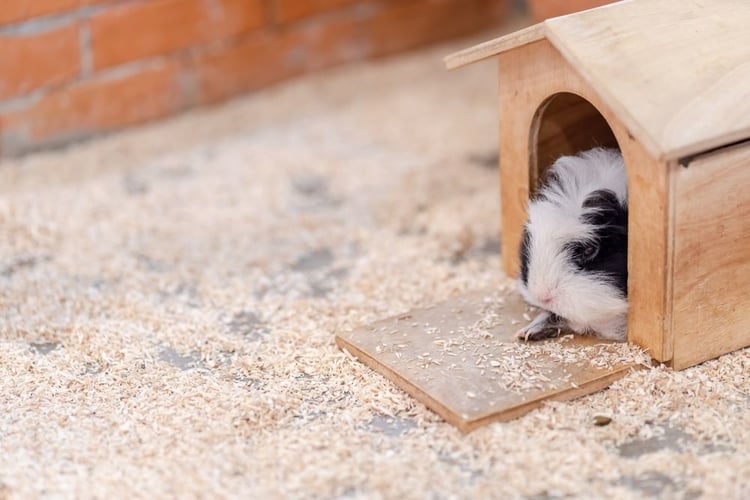
Three weeks after birth is the best time to separate baby guinea pigs from their mothers. You can wait up to four weeks, but that is the maximum amount of time to wait.
Males must be separated after 21 days, but females can stay with their mothers. If you wait too long, you risk more breeding.
This level of inbreeding for cavies does not produce healthy babies and can lead to very complicated and dangerous pregnancies.
If you feel bad about separating the newborns from their mom, there is no need to worry. As humans, it can be hard for us to understand why they need to be separated.
I would like to remind you that different species have different needs. You will not be harming your piggy if you separate them from their mother.
In fact, you will be keeping them safe. Properly separating newborn guinea pigs at the right time in their life is crucial to their health and development.
For pet owners who are not sure about separating their cavies, your vet can be very helpful. I always consult with my vet when separating pups from their mothers.
My vet helps determine the baby’s sex to ensure I am separating them properly. They also check that the newborns are properly nourished and ready to spend time away from their mom.
How do you separate a baby guinea pig from its mother?
Once your female cavy gives birth, it is important to prepare for the newborns when they reach adulthood. Those first three weeks of life go by very quickly, and you may be unprepared if you do not consider their needs early on.
Stock up on guinea pig essentials so you are ready when the babies grow up.
Have extra cages ready to separate your newborns. The males and females need to be in their own crates. You should also not place them directly in cages with other pigs.
You will need to follow the proper steps to introduce your baby piggy to others. This will help prevent fighting and aggression.
First, let your newborn guinea pigs get used to living with their brothers or sisters away from their mother. They should be able to drink from a water bottle and eat solid foods by the time you separate them at three weeks.
I recommend waiting another week or two before transferring the babies to crates with other pigs.
Can baby guinea pigs survive without their mother?
Yes, baby guinea pigs can survive without their mother. In the case of a rejected piggy, you are able to step in and care for them until they are grown.
Just follow the care tips listed above to ensure the pup grows up properly without the watchful eye of their mother. This process will require a lot more of your care and attention than a piggy being raised by their mother.
However, you are the pup’s only chance at survival if they are rejected by their mother.
Guinea pigs reach maturity very quickly. At three weeks old, you can start to treat the newborn guinea pigs like adult guinea pigs. They can be weaned off their mother’s milk and eat a typical, balanced diet. As odd as it may seem, they no longer need the care and protection of their mother.
They can safely survive without her as they continue to grow. However, it is important to wait until they are fully weaned before separating them from their mother to ensure their survival.
Do baby guinea pigs drink water?
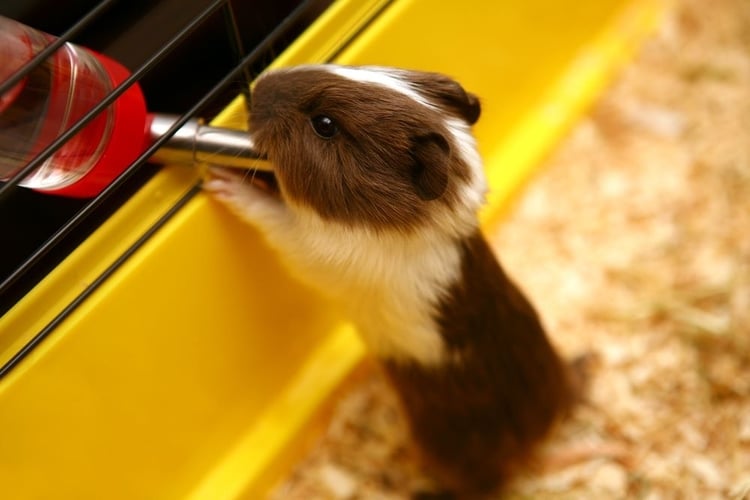
Yes, baby guinea pigs drink water. They need constant access to fresh water, just like adult cavies. Newborns may not ready to drink water for a while, but it is totally up to them.
They may drink only milk for a while before they become curious about the water bottle. Watching their mother drink from the water bottle can also encourage them to copy her behavior.
Step by step guinea pigs babies care
If you are feeling overwhelmed about proper guinea pig baby care, that is perfectly normal. I find it stressful to care for my pets from time to time, so I research their care and stay diligent about their environment and diet.
Here are some additional tips to care for your pups after they are born.
- The cage shared by the mother and newborns should be at least 8 square feet
- Purchase a cage with a deeper pan to keep the pups from escaping through the crate bars
- Secure grids outside of the cage to keep the newborns inside
- Place an additional water bottle in the cage at a lower height so the newborns can reach it
- The cage should be in a quiet area of your home
- Keep the cage out of direct sunlight or the path of an air vent
- Handle newborns early and often as long as you do not interfere with their mother’s care
- Feed newborns extra calcium during their first few weeks to properly grow their bones
- The rest of the pup’s diet is similar to adult cavies
- Use a sturdy food bowl
- Keep a close eye on them to prevent illness – scurvy is even more serious in babies
- Keep their bedding clean – regularly change it to maintain cleanliness
- Let them play with toys – ramps and tunnels are safe for baby guinea pigs
- They do not need baths when they are young – they keep themselves clean with their mother’s help
- Newborns will start nursing within 24 hours after birth
- Babies may be able to eat solid foods after two days
Conclusion
A new litter of guinea pigs is exciting! You have precious little newborns to care for and watch as they grow. All of the information and tips I’ve listed above will help you keep the newborns safe and healthy as they mature.
As long as you properly care for the newborns and their mothers, they will not experience any problems. If you are going to rehome your newborns, do so only after they have weaned off their mother’s milk. Otherwise, you can welcome the new additions to your furry family!

Lydia King is a huge animal lover and has always been fascinated with learning about the animal kingdom. She enjoys writing about anything animal related from scientific information about rare species to animal references in pop culture.






